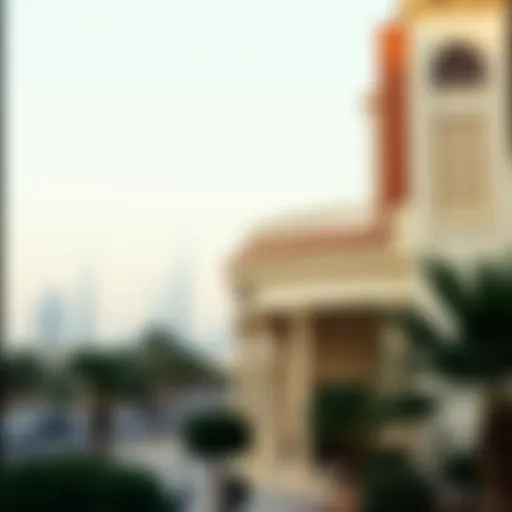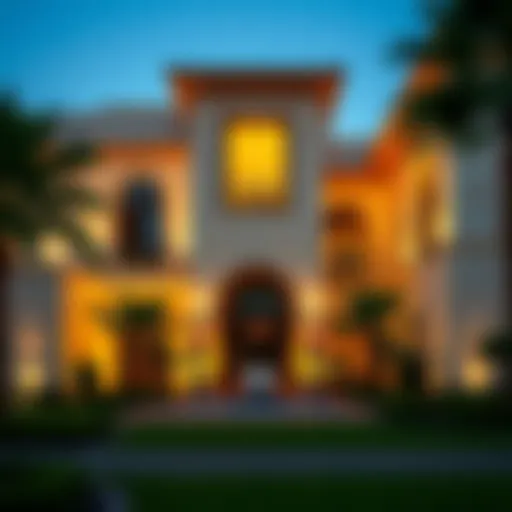Zen Dubai: Exploring Tranquility in Urban Living


Intro
In the heart of one of the world's most dynamic cities, Dubai, emerges a concept that seems almost paradoxical: the blend of serenity and urban vibrancy. Zen Dubai encapsulates this intriguing intersection. Imagine a place where the sleek lines of modern skyscrapers coexist with tranquil gardens and mindfulness practices. With rising noise levels and rapid developments, how does one seek calm in a hive of activity?
This article explores that very notion, guiding potential investors, homebuyers, and urban enthusiasts through the nuances of finding tranquility amid the hustle and bustle. Here, we will identify key trends, pinpoint thriving neighborhoods, and outline investment opportunities that embrace the essence of Zen living.
These insights aim to empower not only new residents but also seasoned developers ready to tap into this unique market segment. Understanding how tranquility can be integrated into a fast-paced lifestyle opens new avenues for creating spaces that nurture both the body and the mind.
While some might think tranquility is hard to come by in a city renowned for its opulence, we will uncover that stillness can indeed be part of the urban narrative. With thoughtful design and strategic investment, Dubai is capitalizing on its potential not only as a leading cosmopolitan hub but also as a sanctuary for those yearning for a serene lifestyle.
Market Trends and Insights
Current Market Conditions
Dubai’s real estate market has experienced a noticeable shift in recent years. Post-pandemic recovery has pushed demand for properties that emphasize space, nature, and wellness. Buyers are looking for homes that offer more than just a place to live; they seek environments that promote wellbeing within the fast-paced urban life. This growing trend has sparked interest in properties that integrate Zen-like elements, such as open spaces, natural light, and landscaped exteriors.
Real estate analysts report notable increases in demand for developments that combine residential units with communal areas designed for relaxation and mindfulness activities. This reflects a broader expectation from buyers, who are keen to create a lifestyle that balances career ambitions with personal wellness.
Future Predictions and Projections
As we look ahead, experts forecast that the demand for Zen-inspired living spaces will only amplify. The upcoming years are expected to see a rise in mixed-use developments, where residential, commercial, and recreational spaces meld together to create harmonious living environments. Urban planners are now tapping into principles of mindfulness and sustainable architecture, ensuring that future projects align with serenity while catering to an diverse array of lifestyles.
Market analysts posit that areas such as Dubai Marina and Jumeirah Lakes Towers will continue to transform as they embrace the spirit of Zen. On the flip side, emerging neighborhoods, like Dubai Hills Estates and the Dubai Creek area, are seen as potential frontiers for tranquil living, integrating nature with city life.
"The continued growth in demand signals a shift towards mindful living spaces that reflect the values of today’s discerning buyers."
Investment Opportunities
Emerging Neighborhoods
For those looking to make investments, understanding which neighborhoods embody the Zen lifestyle can prove rewarding. Noteworthy areas include:
- Dubai Hills Estate: With its expansive parks and a focus on greenery, it promotes a calm lifestyle while still being close to the city.
- Dubai Creek Harbour: Envisioned as a development that prioritizes sustainability, this area offers waterfront properties, enhanced by nature-filled surroundings.
- Palm Jumeirah: A luxury destination where serene beachfront properties provide a tranquil escape from daily life, it’s ideal for high-end investors seeking the ultimate Zen haven.
These neighborhoods not only provide potential for financial returns but also foster a lifestyle enriched by tranquility.
Types of Properties to Invest In
Investors should focus on specific types of properties that embody the Zen concept:
- Boutique Residences: Offering unique designs that integrate natural elements, these properties provide a personalized living experience.
- Wellness-Oriented Developments: Projects featuring wellness amenities like yoga studios, meditation gardens, and spas align with health-oriented buyers.
- Luxury Villas with Green Spaces: These properties allow for privacy and solitude, often incorporating gardens and water features that enhance the overall serenity.
As the demand for tranquility continues to grow, investors who identify the right properties can capitalize on an emerging trend while creating spaces that nourish the soul amid urban life.
Prelude to Zen Dubai
As the world's cities continue to grow, the search for tranquility amidst the chaos seems more crucial than ever. Zen Dubai emerges as a concept that marries the elegance of urban life with the profound tranquility of Zen philosophy. This section explores the interplay of serenity and modernity, setting the stage for deeper discussions on architectural design, community aspects, and lifestyle choices within this vibrant metropolis.
In a city often synonymous with opulence and rapid development, understanding what Zen means in this urban setting provides a refreshing perspective. The importance of such a dialogue cannot be overstated; it helps to appreciate how the principles of simplicity, nature-inclusiveness, and mindfulness can manifest even amidst the skyscrapers and bustling markets of Dubai.
Moreover, this article aims to illuminate the benefits and considerations of living in such Zen-inspired spaces. Investors and homebuyers alike will find value in these discussions, as these unique properties not only offer aesthetic appeal but also promote a lifestyle centered around well-being and balance.
Defining Zen in Urban Context
To grasp the essence of Zen in an urban context, one must first navigate the roots of the philosophy itself, which emphasizes mindfulness, simplicity, and a deep connection with nature. In Dubai, this manifests through various architectural and urban planning choices that echo these principles.
While city life often complicates circumstances, incorporating Zen elements into it can be as simple as creating peaceful courtyards, using natural materials, and ensuring that open spaces are not just afterthoughts but integral to design. By cultivating these connections, residents can find their slice of serenity amidst the urban environment, elevating their sense of home and well-being.
Significance of Serenity in City Living
As individuals delve into city living, the overwhelming noise, hustle, and bustle can often lead to a disconnection from one's inner self. Herein lies the significance of serenity in urban life. The essence of a serene lifestyle can aid residents in managing stress levels, enhancing mental clarity, and improving overall quality of life.
In Dubai's fast-paced real estate market, properties that prioritize tranquility offer a touchstone for buyers seeking not just a place to live but a sanctuary that embodies a lifestyle. When prospective homeowners consider purchasing a property, they now often look beyond mere aesthetics; the integration of serene elements becomes a defining factor in their decisions.
"Finding a balance between urban vibrancy and quietude is not just a luxury but a necessity in today’s hectic world."
Through mindful living, residents engage not only with their environment but also with their community, thus fostering a sense of belonging and shared tranquility. Establishing communities that reflect Zen principles transcends mere architecture; it promotes harmony between individuals and their surroundings, a vital aspect for sustainable urban living.
Architectural Aspects of Zen Design


The integration of Zen principles into architectural design offers a refreshing counterpoint to the frenetic pace of urban life, especially in a city as dynamic as Dubai. Architecturally speaking, Zen design emphasizes harmony with the environment, mindfulness in construction, and functional simplicity. Each structure becomes not just a dwelling but a sanctuary that nurtures tranquility and reflection. This section will focus on how Zen architecture contributes to this philosophy, highlighting key elements that enhance serenity amid the bustling urban landscape.
Key Elements of Zen Architecture
Natural Materials
Natural materials play a pivotal role in realizing the Zen vision within architectural designs. By utilizing resources such as bamboo, stone, and reclaimed wood, builders craft environments that feel organic and alive. One significant characteristic of natural materials is their ability to age gracefully; they wear with dignity, often adding character over time. This feature is particularly beneficial for Zen-inspired spaces, as it aligns with the concept of impermanence in life and nature.
Moreover, natural materials foster a sense of connection between the occupants and their surroundings, creating a warm atmosphere that enhances mindfulness. For instance, when light filters through wooden structures, it casts beautiful shadows, leading to a shifting interplay between nature and human-made environments. However, while they are sustainable and inviting, natural materials may require more maintenance than synthetic options, depending on the climate and conditions.
Open Spaces
Open spaces are another cornerstone of Zen architecture, emphasizing freedom and light. They allow for a seamless flow between indoor and outdoor areas, encouraging residents to connect with nature. A significant characteristic of open spaces is their capacity to reduce stress; expansive views can evoke feelings of calm and spaciousness, counteracting the dense urban congestion outside.
The unique aspect of open spaces consists of their versatility—these areas can be designed to suit various uses, whether for quiet contemplation or social gatherings. The downside is that planning such spaces might require a larger footprint than conventional designs, potentially impacting land use efficiency, especially in densely populated regions such as Dubai.
Light and Shadow
The dance of light and shadow is intrinsic to Zen design, enhancing the overall ambiance of a space. Thoughtful placement of windows and openings can invite natural light to cascade through, illuminating spaces while creating contrast through shadows. This interplay leads to an ever-changing environment, which can evoke different feelings throughout the day.
Notably, light and shadow can also encourage mindfulness. As residents experience shifts in lighting, they are prompted to pause and appreciate the beauty of their surroundings. While this aspect significantly enhances aesthetic appeal, it can be a double-edged sword; poorly designed light pathways can result in areas that feel too bright or too dim, possibly detracting from the intended calming effect.
Prominent Zen-Inspired Developments in Dubai
Zen architectural principles have sparked a new wave of developments in Dubai, where serenity meets modern living. The blending of these ideologies creates spaces that resonate not only with aesthetics but also with lifestyle choices that prioritize emotional well-being.
Villa Projects
Villa projects infused with Zen philosophy focus on spacious, luxury living while maintaining a connection with the environment. Characteristics of these villas include expansive gardens, water features, and tranquil courtyards that enhance relaxation. Their unique feature is the incorporation of green terraces, which transform outdoor spaces into serene escapes.
However, the appeal of such villas comes with a price—both financially and in terms of land use. Zoning regulations can limit expansion and necessitate compromises, presenting challenges in achieving an ideal balance between nature and modern architecture.
Apartment Complexes
Zen-inspired apartment complexes are beginning to crop up in various neighborhoods, characterized by their minimalist design and community-centered layouts. These complexes often include facilities for mindfulness activities and communal gardens. A highlight of these developments is their strategic location near parks, enhancing the residents' access to nature.
Such complexes, while promoting community living and wellness, may face concerns related to privacy. High-density living sometimes means sharing spaces, which could detract from personal serenity—an essential aspect of a Zen lifestyle.
Commercial Spaces
Zen concepts are also extending into commercial spaces, where tranquility can promote better employee well-being and productivity. These spaces often feature open layouts, natural elements, and areas designed for relaxation and meditation. A distinct attribute here is the creation of "mindful work zones" that encourage breaks and promote mental clarity.
Despite their many benefits, integrating Zen principles in commercial settings can be challenging due to commercial norms and the demand for high-capacity usage. Striking a balance between efficient space use and maintaining a Zen atmosphere requires thoughtful planning and design strategies.
"The beauty of Zen architecture lies not only in its aesthetic but in its ability to cultivate peace and reflection amid the urban rhythm."
In summary, the architectural aspects of Zen design provide a compelling framework for living harmoniously in an urban environment. From the careful selection of natural materials to the importance of open spaces and the interplay of light and shadow, each element contributes to the broader narrative of creating tranquil living and working spaces in Dubai.
The Role of Nature in Zen Living
The essence of Zen living in an urban context cannot be separated from the influence of nature. In the hustle and bustle of city life, where the clang of construction vehicles and the buzz of crowds create a constant backdrop, the presence of natural elements becomes a sanctuary. Nature serves a dual purpose, acting both as a balm for the weary and as a reminder of balance amidst chaos.
Incorporating nature into urban settings not only enhances aesthetic appeal but also fosters mental well-being. The green patches, trees, and water features infuse life into cement jungles, offering residents a chance to reconnect with their environment.
Furthermore, studies have shown that exposure to nature can reduce stress levels, improve mood, and increase cognitive function. Thus, creating spaces that blend the urban with the natural is more than a design choice; it’s an investment in better quality of life for residents.
Integrating Nature into Urban Environments
Integrating nature into urban environments is essential for achieving the tranquility associated with Zen living. This can involve a range of practices, from the planting of local flora to the thoughtful design of communal spaces that invite greenery. For instance, vertical gardens, which might cover building facades, present a practical way to increase green space without requiring large land areas. These living walls not only offer visual appeal but can also help in cooling buildings, thus saving energy.
Additionally, incorporating parks and natural trails in urban planning transforms how communities interact. A park, featuring paths and open areas, provides a slice of nature where residents gather, exercise, and relax. Such integration deepens community ties and enhances the overall living experience in high-density areas.
Landscaping Techniques that Promote Zen
- Water Features
Water plays a crucial role in achieving a Zen-like ambiance. Water features, such as ponds, fountains, or even small streams, create a soothing soundscape that drowns out urban noise, making them popular in Zen design. Their reflective surfaces can offer a visual calmness and encourage mindfulness. However, it’s important to consider the maintenance these features might require. While they offer tranquility, the upkeep can be demanding. Residents must weigh the aesthetic and psychological benefits against the practicalities of maintenance. - Gardens and Green Roofs
Gardens and green roofs can transform spaces into peaceful retreats. These areas utilize plants to foster an environment that both purifies air and lowers temperatures, thus promoting energy efficiency. The act of tending a garden can also be therapeutic. A green roof, in particular, adds life to buildings while providing insulation. While the initial investment may be higher compared to traditional roofing systems, the long-term savings on energy bills and the added property value are often well worth the consideration. - Pathways and Serenity Zones
Pathways are the veins through which a garden flows, guiding residents through spaces designed for reflection and relaxation. These paths can feature gentle curves, soft materials, and a variety of plant species to engage the senses. Serenity zones, perhaps with seating areas or meditation spots, offer a designated space for quiet contemplation. The benefit of such areas lies in their ability to provide an escape; however, careful planning is crucial to ensure they remain private and unaffected by the constant hum of a city.
In summary, the role of nature in Zen living is profound. By understanding and embracing the various methods to integrate natural elements into urban planning, we can enrich not only the aesthetics of our living spaces but also their livability. Real estate investors and homebuyers alike should consider these aspects to enhance their experience in Dubai's exciting yet often chaotic urban landscape.
Real Estate Market Insights


The connection between the real estate market and the Zen lifestyle represents a pivotal aspect of understanding how tranquility is woven into the fabric of urban living in Dubai. The current market landscape reflects a broadening appreciation for properties that offer not just shelter, but a sanctuary from the ever-buzzing city environment. Investors and homebuyers are now more than ever seeking out homes that are far more than a place to lay their heads at night; they desire spaces imbued with a sense of peace and grounding.
Current Trends in Zen Properties
There's an increasing demand for properties that focus on harmonizing living spaces with nature. Mindfulness principles have started to seep into property designs, influencing everything from spatial layouts to the materials used in construction. Potential buyers are gravitating towards homes that incorporate gardens, open layouts, and natural light. Importantly, this trend does not just enhance the aesthetic value; it can also promote physical and mental well-being, an appealing aspect when considered for purchase.
- Mindful Designs: Properties featuring open spaces encourage natural flow which can alleviate stress.
- Eco-Friendly Materials: Many new constructions are seeing the use of bamboo, reclaimed wood, and stone, aligning with Zen principles of sustainability.
- Integration of Nature: Indoor gardens, water features, and balconies become more than decorative elements; they help create serene environments that further enhance the Zen experience.
Investment Potential of Zen Living Spaces
Market Growth
The real estate market for Zen-inspired properties in Dubai is not just a fleeting trend; it is undergoing significant growth. This uptick suggests a discernible shift in consumer preferences, highlighting a burgeoning fascination with tranquil living environments. This aspect invites investors who are looking for reliable opportunities to put their money.
- Key characteristic: The marriage of serenity and productivity speaks to a fresh demand, typically referred to as the wellness real estate sector.
- Advantages: Zen properties can often command higher prices due to their unique offerings. Buyers frequently display a willingness to spend more for homes with wellness attributes, providing developers with ample market opportunity.
Target Demographics
Understanding who is seeking Zen living spaces is critical for tapping into this niche market. The demographic trends show that millennials and Gen Z are particularly inclined towards seeking properties that emphasize balance and mindfulness. These generations are more historically motivated towards sustainability and wellness than previous generations.
- Characteristics: Affluent younger buyers often prioritize settings conducive to mental well-being, drastically shifting market demands.
- Pros and Cons: While this demographic represents a promising market, their demands can also be strict. They typically expect more holistic living experiences, which can push developers to adapt swiftly to maintain competitiveness.
Long-term Viability
The long-term viability of Zen properties remains a compelling narrative within the broader context of urban development. As societies become increasingly congested, the need for peaceful havens only intensifies. By investing in properties that uphold tranquility, both buyers and developers are positioning themselves at the forefront of an ongoing shift towards mindful living.
- Characteristics: Properties designed with Zen in mind are less susceptible to market fluctuations as they address timeless needs.
- Advantages: The long-term commitment to creating community-focused, serene environments can affirm enduring interest and potential appreciation in property values.
The landscape of Zen living spaces in Dubai is, in many ways, the future of urban living. As the city grows and adapts, the intertwining of peace and productivity represents a promising frontier for stakeholders.
"In the heart of the urban chaos, there lies an oasis of tranquility awaiting the discerning buyer."
With a keen understanding of the trends shaping the market and the demographics driving demand, investors can take strategic steps towards securing their position in this thriving sector.
Lifestyle and Community Aspects
The exploration of lifestyle and community aspects in Zen Dubai is essential for understanding how tranquility can flourish within the fast-paced environment of this vibrant metropolis. When discussing Zen living, it's crucial to examine how these elements not only enhance individual well-being but also foster a broader sense of connectedness among residents. A community that embraces Zen principles creates an oasis where mindfulness and harmony can thrive amid urban chaos.
One of the most significant factors affecting lifestyle in Zen Dubai is the promotion of communal spaces designed to center around relaxation and reflection. Parks adorned with local flora, quiet zones for meditation, and spaces for group activities are interspersed within developments, encouraging residents to engage in healthy interactions and cultivate relationships.
Creating Zen Communities in Dubai
Establishing Zen communities in Dubai goes beyond just constructing buildings; it focuses on creating a lifestyle centered on mindfulness and peace. Zen communities prioritize shared experiences and offer residents opportunities to collaborate on community projects, art initiatives, or wellness retreats. These activities not only raise awareness of the importance of tranquility but also help in building bonds among neighbors.
For instance, residential areas could feature open-air yoga classes that welcome everyone. Such initiatives create an inviting atmosphere and promote wellness while encouraging individuals to connect deeper with their neighbors. By prioritizing inclusive practices, the foundation of a supportive and nurturing community is built.
Cultural Influences on Zen Living
Cultural elements deeply influence the concept of Zen living in Dubai. The harmonious blend of traditions and modern lifestyles cultivates unique expressions of serenity. By incorporating cultural practices such as meditation, art, and wellness initiatives, Dubai brings forth a more enriching Zen experience.
Meditation Practices
Meditation practices hold a significant role in fostering a sense of peace and unity within communities. Individuals engaging in meditation often report reduced stress levels, increased focus, and a greater sense of connection with themselves and others. This practice is integral for promoting emotional well-being.
A key characteristic of meditation in Zen communities is its adaptability. From traditional forms like Zen sitting to modern mindfulness practices, options cater to various preferences and needs. This versatility makes meditation accessible to many, paving the way for its popularity in urban spaces like Dubai.
However, one must note the unique feature of communal meditation sessions. They not only allow individuals to practice together but also foster a sense of belonging. The shared experience can deepen personal connections and enhance the community's collective spirit.
Art and Aesthetics
Art and aesthetics serve a pivotal role in enriching the Zen experience within Dubai. The visual integration of art fosters emotional connection and inspires tranquility. Traditional and contemporary art can discuss themes of nature, peace, and mindful living, creating spaces that reflect these ideals.
One key characteristic of art in this context is its capacity to transcend barriers, appealing to a wide audience whether they are locals or expatriates. Moreover, art installations and exhibitions encourage community interactions and cultural exchange.
Yet, a unique challenge arises; the types of art that resonate most can vary significantly among community members. Thus, balancing diverse preferences can sometimes lead to contention in what is deemed beautifully or adequately Zen. The importance lies in navigating these differences to cultivate a serene consensus.
Wellness Initiatives
Wellness initiatives play an essential role in nurturing a Zen lifestyle. From nutrition workshops to fitness classes tailored for all ages and abilities, these programs seek to empower residents with knowledge and tools to enhance their overall well-being.


A defining feature of wellness initiatives in Zen communities is their holistic approach; they aim to not just focus on physical well-being but also mental and emotional health. This multifaceted perspective fosters deeper ties across the community as individuals learn from and support one another in their wellness journeys.
However, one must acknowledge a potential drawback: the accessibility of such initiatives can vary based on location and resources. Ensuring that all community members benefit equally remains a challenge requiring ongoing effort.
Challenges in Achieving Zen
In the context of Zen Dubai, the notion of tranquility seems paradoxical against the backdrop of one of the most dynamic cities on the planet. The challenges of achieving a Zen-like existence in urban environments become all the more pronounced, as the fast-paced lifestyles and competitive ethos of the city can often overshadow the serenity sought by its inhabitants. Navigating these challenges requires a deliberate approach, focusing on how to foster a sense of peace despite the myriad urban pressures that bombard us daily.
Urban Pressures and Noise Pollution
Urban pressures are a double-edged sword. The hustle and bustle of city life brings with it opportunities for success and growth, but it also introduces a cacophony that can drown out moments of stillness. In Dubai, where construction projects echo like an incessant drum, noise pollution emerges as a significant barrier to achieving Zen.
The constant background noise can be overwhelming – from traffic to construction activities, the symphony of urban life seems tireless. Addressing this issue is essential for creating spaces conducive to mindfulness.
- Soundproofing Techniques: Buildings designed with sound insulation in mind can significantly mitigate the impact of external noise, creating a sanctuary within the urban setting. Incorporating materials like acoustic panels or double-glazed windows can be a game changer.
- Designated Quiet Zones: Parks and gardens designed as serene retreats can provide relief. For instance, the Dubai Design District harbors spaces with fewer distractions where individuals can escape and recharge.
These solutions will not only enhance personal well-being but will also increase property value, making them attractive aspects for investors and homebuyers looking for tranquility.
Balancing Modernity with Tranquility
In the quest for creating a Zen-inspired living space, balancing modernity with tranquility is imperative. Dubai is renowned for its innovations and iconic skyline, but this very advancement often comes at the expense of nature and solace.
The key lies in integrative design, one that harmonizes contemporary architectural aesthetics with natural elements. This approach doesn’t only preserve beauty but fosters serenity:
- Native Landscaping: Use plants that are native to the region. This practice not only preserves local biodiversity but also reduces maintenance costs. Dry gardens or landscapes that require minimal water can symbolize the essence of sustainability.
- Thoughtful Urban Planning: Modern projects must incorporate open areas that breathe life into the community. Mixed-use developments that include parks or quiet corners encourage relaxation amid fast-moving urban settings.
- Incorporating Mindfulness Practices: Space should accommodate activities that promote mental well-being, such as yoga studios with views of nature, ensuring that both residents and visitors have easy access to practices that nurture peace of mind.
By thoughtfully integrating these elements, the future of Zen in urban Dubai can maintain a harmonious balance between its modern identity and the peaceful existence that many seek.
"As we aspire to transform the urban landscape into one of peace, we must not forget that tranquility is an art that requires continuous effort and consideration."
Future of Zen in Dubai Real Estate
As Dubai forges ahead as a hallmark of cosmopolitan living, the concept of Zen is becoming increasingly relevant in the realm of real estate. The intricate balance of modernity and tranquility is essential for fostering a living environment that allows residents to thrive. This section aims to explore this balance in detail, focusing on emerging trends and sustainable living initiatives that are redefining urban spaces.
Emerging Trends to Watch
In recent years, a noticeable shift towards eco-friendly and Zen-inspired real estate has emerged in Dubai. Homebuyers and investors alike are leaning towards properties that promote serenity through design and community. Here are some trends that warrant attention:
- Biophilic Design: The infusion of natural elements into buildings not only beautifies spaces but also enhances mental well-being. This design philosophy emphasizes the connection between nature and architecture.
- Mindful Amenities: Properties that feature spaces for meditation, wellness facilities, and outdoor environments have become highly sought after. These amenities support mental health and help cultivate a sense of peace in the urban chaos.
- Smart Technologies: Integrating smart home technologies aligns with the Zen principle of simplicity, allowing for effortless control of environmental settings, enhancing comfort.
These trends provide a roadmap for future developments, ensuring that properties not only cater to luxury but also prioritize peace and mindfulness.
Vision for Sustainable Living
As sustainability takes center stage in the urban landscape, Zen living evolves to embrace these principles deeply. The focus is on creating neighborhoods that foster community bonds while adhering to eco-friendliness. Two key elements driving this vision are:
Green Building Certifications
Green building certifications such as LEED (Leadership in Energy and Environmental Design) are reshaping the industry by emphasizing energy efficiency and sustainable materials. These certifications are critical because:
- Sustainability Validation: They serve as a standard for assessing a building's environmental impact, ensuring prospective owners that their investments align with eco-conscious standards.
- Enhanced Property Value: Properties with such certifications often see an increase in market value as buyers look for long-term sustainability and lower operational costs.
Overall, the incorporation of these standards ensures that developments contribute positively to the environment and community.
Community-Driven Developments
Community-driven developments embody the essence of Zen by promoting collaboration, inclusion, and the creation of supportive networks among residents. This approach is beneficial for several reasons:
- Holistic Growth: These projects often prioritize inclusive spaces where diverse groups can interact, paving the way for vibrant community life that enhances well-being.
- Collective Resources: By pooling resources, residents can more effectively manage amenities and services, fostering a greater sense of ownership and responsibility.
The emphasis on community not only supports individual well-being but cultivates a sense of belonging, which is especially beneficial in fast-paced urban environments like Dubai.
Ultimately, the future of Zen in Dubai's real estate is rooted in fostering environments that prioritize peace, community, and sustainability. As more developments embrace this holistic approach, the landscape will evolve into spaces that nourish both mind and spirit.
Culmination
Drawing from the depths of our exploration into the serene yet vibrant world of Zen Dubai, it's clear that the blend of tranquility and urban life is no passing trend. Instead, it's a thoughtful response to the chaos of city living. Through the lens of architecture, lifestyle, and community, we've seen how peace can be interwoven into the fabric of everyday life in a city known for its bustling energy.
Recap of Zen Dubai's Appeal
In summarizing the appeal of Zen Dubai, one must consider the various layers that contribute to its unique charm. The architectural elements discussed, from natural materials to open spaces, highlight a design philosophy that prioritizes calm and mindfulness. Moreover, developments such as Al Barari offer not just homes but a lifestyle—one that values wellness and community coherence. The integration of nature through landscaping techniques, like lush gardens and winding pathways, fosters an environment conducive to Zen practices, resonating with residents and investors alike. This creates a kind of urban oasis, setting itself apart from traditional city living.
Encouraging Informed Decisions
For potential homebuyers and investors, making informed decisions in the realm of Zen properties is imperative. With the data gathered throughout this article, stakeholders can better understand market dynamics and identify opportunities that align with the principles of Zen living. It's essential to consider factors such as the investment potential of these properties, the profile of target demographics, and the sustainability credentials behind projects. Projects that prioritize green technologies and community-oriented approaches are likely to yield higher returns in the long run.
Ultimately, immersing oneself in the Zen philosophy as part of the decision-making process will not only lead to better investments but also foster a more enjoyable and enriching living experience. As Dubai continues to evolve, the demand for thoughtful and serene living spaces will certainly persist, presenting an encouraging outlook for all involved.















